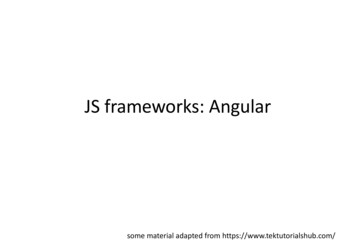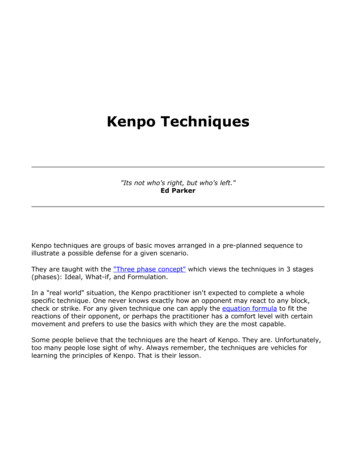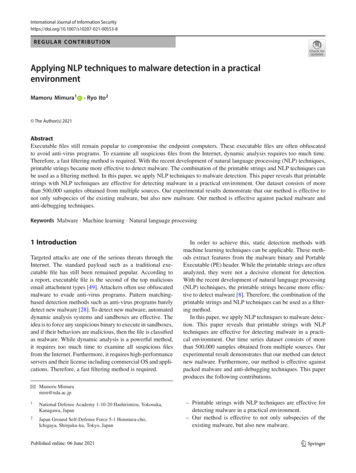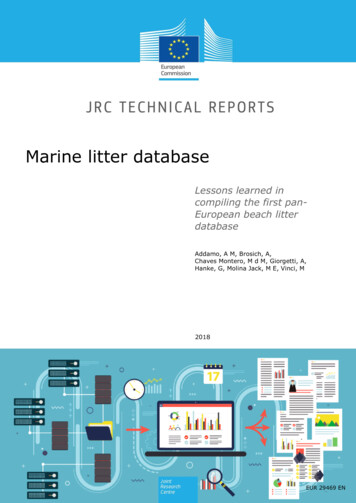
Transcription
COS320: Compiling TechniquesZak KincaidJanuary 24, 2022
Welcome! Instructor: Zak Kincaid TA: Nicolas Koh
What is a compiler? A compiler is a program that takes a program written in a source language and translates itinto a functionally equivalent program in a target language. Source languages: C, Java, OCaml, . Target languages: x86 Assembly, Java bytecode, C, .
What is a compiler? A compiler is a program that takes a program written in a source language and translates itinto a functionally equivalent program in a target language. Source languages: C, Java, OCaml, . Target languages: x86 Assembly, Java bytecode, C, . A compiler can also Report errors & potential problems Uninitialized variables, type errors, . Improve (“optimize”) the program
Why take COS320?You will learn: How high-level languages are translated to machine language How to be a better programmer What can a compiler do? What can a compiler not do? Lexing & Parsing (Some) functional programming in OCaml A bit of programming language theory A bit of computer architecture
Course resources Website: 22/cos320/ Assignments and zoom link available through canvas Email me at least one hour before lecture if you need me toactive zoom Discussion forum on ed Office hours: Monday 2:00-3:00pm (Zak), more TBAor by appointment Recommended textbook:Modern compiler implementation in ML (Appel) Real World OCaml (Minsky, Madhavapeddy, Hickey)realworldocaml.org
GradingHomework teaches the practice of building a compiler; midterm & final skew towards theory. 60% Homework 5 assignments, not evenly weighted Expect homework to be time consuming! 20% Midterm Wednesday March 2, in class 20% Final
Homework policies Homework can be done individually or in pairs Due on Mondays at 11pm, with 1 hour grace period Can be submitted max 5 days late. 10% penalty per day late, with first four late days(across all assignments) waived. Feel free to discuss with others at conceptual level.Submitted work should be your own.
Compilers
(Programming) language syntax semantics Syntax: what sequences of characters are valid programs? Typically specified by context-free grammar expr :: integer variable expr expr expr expr ( expr ) Semantics: what is the behavior of a valid program? Operational semantics: how can we execute a program? In essence: an interpreter Axiomatic semantics: what can we prove about a program? Denotational semantics: what mathematical function does the program compute?
(Programming) language syntax semantics Syntax: what sequences of characters are valid programs? Typically specified by context-free grammar expr :: integer variable expr expr expr expr ( expr ) Semantics: what is the behavior of a valid program? Operational semantics: how can we execute a program? In essence: an interpreter Axiomatic semantics: what can we prove about a program? Denotational semantics: what mathematical function does the program compute?The job of a compiler is to translate from the syntax of one language to another, but preservethe semantics.
1#i n c l u d e stdio .h 345678910i n t factorial ( i n t n) {i n t acc 1;w h i l e (n 0) {acc acc * n;n n - 1;}r e t u r n acc ;}121314i n t main ( i n t argc , c h a r * argv []) {printf (” factorial (6) %d\n” , factorial (6));}
1234567891011factorial :movlcmpqjl.LBB0 1 :imulqdecqcmpqjg.LBB0 2 :retq1314151617main :movlmovlcallqretq192021 1 , %r a x 2 , %r d i.LBB0 2%r d i , %r a x%r d i 1 , %r d i.LBB0 1 . s t r , %r d i 720 , %r s iprintf.globl.str.str :.asciz” F a c t o r i a l i s %l d \n ”
Compiler phases (simplified)Source textLexingFrontendToken streamParsingAbstract syntax treeTranslationIntermediate representationBackendCode generationAssemblyOptimization
Lexing123456i n t acc 1;w h i l e ( n 0) {acc * n ;n - -;}r e t u r n acc ;123456INT , IDENT ” acc ” , EQUAL , INT 1 , SEMI ,WHILE , LPAREN , IDENT ” n ” , GT , INT 0 , RPAREN , LBRACE ,IDENT ” acc ” , TIMESEQUAL , IDENT ” n ” , SEMI ,IDENT ” n ” , DECREMENT , SEMI ,RBRACERETURN , IDENT ” acc ” , SEMIblockdeclintaccParsingreturnwhileblock 1n0accacc--* nn
blockdeclintaccreturnwhileblock 1n0accacc--* nnTranslation%count alloca i64%acc alloca i64store i64 %n, i64* %countstore i64 1, i64* %accbr label %loop%t1 load i64, i64* %count%t2 icmp sgt i64 %t1, 0br i1 %t2, label %body, label %exit%t3 %t4 store%t5 storeload i64, i64* %accmul i64 %t1, %t3i64 %t4, i64* %accsub i64 %t1, 1i64 %t5, i64* %countbr label %loopF%t6 load i64, i64* %accret i64 %t6T
%count alloca i64%acc alloca i64store i64 %n, i64* %countstore i64 1, i64* %accbr label %loop%t1 load i64, i64* %count%t2 icmp sgt i64 %t1, 0br i1 %t2, label %body, label %exit%t3 %t4 store%t5 storeload i64, i64* %accmul i64 %t1, %t3i64 %t4, i64* %accsub i64 %t1, 1i64 %t5, i64* %countbr label %loopFT%t6 load i64, i64* %accret i64 %t6Optimization%count i64 %n%acc i64 1br label %loop%count2 phi i64 %count, %count1%acc2 phi i64 %acc, %acc1%t2 icmp sgt i64 %count2, 1%acc1 mul i64 %acc2, %count2%count1 sub i64 %count2, 1br label %loopbr i1 %t2, label %body, label %exitF%t6 load i64, i64* %accret i64 %t6T
%count i64 %n%acc i64 1br label %loop%count2 phi i64 %count, %count1%acc2 phi i64 %acc, %acc1%t2 icmp sgt i64 %count2, 1%acc1 mul i64 %acc2, %count2%count1 sub i64 %count2, 1br label %loopbr i1 %t2, label %body, label %exitF%t6 load i64, i64* %accret i64 %t6TCode generation1234567891011factorial :movlcmpqjl.LBB0 1 :imulqdecqcmpqjg.LBB0 2 :retq 1 , %r a x 2 , %r d i.LBB0 2%r d i , %r a x%r d i 1 , %r d i.LBB0 1
COS320 assignmentsBy the end of the course, you will build (in OCaml) a complete compiler from a high-leveltype-safe language (“Oat”) to a subset of x86 assembly. HW1: X86lite interpreter HW2: LLVMlite-to-X86lite code generation HW3: Lexing, Parsing, Oat-to-LLVMlite translation HW4: Higher-level features HW5: Analysis and OptimizationsWe will use the assignments from Penn’s CIS 341, provided by Steve Zdancevic.
Historical note First “modern” compiler for FORTRAN developed at IBM in 1957 Grace Hopper’s 1951 A-0 loader/linker 18 person-years to complete Led by John Backus, who won 1977 Turing award
Historical note First “modern” compiler for FORTRAN developed at IBM in 1957 Grace Hopper’s 1951 A-0 loader/linker 18 person-years to complete Led by John Backus, who won 1977 Turing award You will implement one in a semester
OCaml
Why OCaml? Algebraic data types pattern matching are very convenient features for writing compilers OCaml is a functional programming language Imperative languages operate by mutating data Functional languages operate by producing new data OCaml is a typed language Contracts on the values produced and consumed by each expression Types are (for the most part) automatically inferred. Good style to write types for top-level definitions
Wednesday’s lecture: x86lite Simple subset of x86 ( 20 instructions) Suitable as a compilation target for Oat HW1 on course webpage. Due Feb 7. You will implement: A simulator for X86lite machine code An assembler A loader You may work individually or in pairs
Can be submitted max 5 days late. 10% penalty per day late, with first four late days (across all assignments) waived. Feel free to discuss with other










